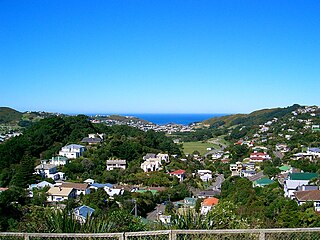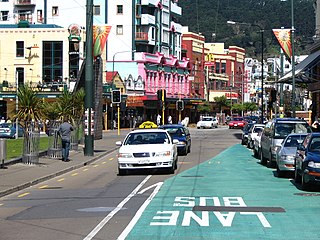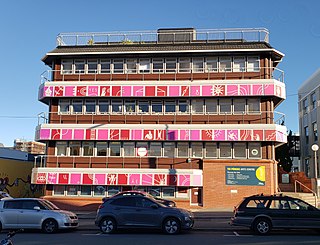Related Research Articles

Vogeltown is a hillside suburb of Wellington, New Zealand, on the eastern slopes of Brooklyn and overlooking Newtown. It is sometimes considered part of Mornington.

Infoshops are places in which people can access anarchist or autonomist ideas. They are often stand-alone projects, or can form part of a larger radical bookshop, archive, self-managed social centre or community centre. Typically, infoshops offer flyers, posters, zines, pamphlets and books for sale or donation. Other items such as badges, locally produced artworks and T-shirts are also often available. Infoshops can also provide printing and copying facilities for people to produce their own literature or have a meeting space.
The Alternative Media Project was a non-profit organization that promoted anarchist media.

Te Aro is an inner-city suburb of Wellington, New Zealand. It comprises the southern part of the central business district including the majority of the city's entertainment district and covers the mostly flat area of city between The Terrace and Cambridge Terrace at the base of Mount Victoria.

Courtenay Place is the main street of the Courtenay Quarter in the Wellington inner-city district of Te Aro.

Cuba Street is a prominent city street in Wellington, New Zealand. Among the best known and most popular streets in the city, the Cuba precinct has been labelled Wellington's cultural centre, and is known for its high-per-capita arts scene the world over.

The Toi PōnekeArts Centre, is the New Zealand capital's creative production facility and support complex. It was established between 2003 and 2005, and was formally opened by Mayor Kerry Prendergast in July 2005. For twelve years previous, the city's arts centre had been based at the much smaller Oriental Bay Rotunda. The new complex, spread across two buildings and seven floors, has a focus on active creative production in all disciplines, and on the further advancement of cultural identity in New Zealand. It is located in the bustling and dynamic Upper Cuba Street neighbourhood of Wellington.

UFFA is an anarchist youth house in Trondheim, Norway. The self-managed social centre provides a location for concerts and self-organised activities such as an infoshop at the Ivar Matlaus Bokkafé, a hacklab and an anarchist newspaper. Squatted in 1981, it moved to its present location the following year. The centre was burnt down in 2010 and then rebuilt.

Self-managed social centres in the United Kingdom can be found in squatted, rented, mortgaged and fully owned buildings. These self-managed social centres differ from community centres in that they are self-organised under anti-authoritarian principles and volunteer-run, without any assistance from the state. The largest number have occurred in London from the 1980s onwards, although projects exist in most cities across the UK, linked in a network. Squatted social centres tend to be quickly evicted and therefore some projects deliberately choose a short-term existence, such as A-Spire in Leeds or the Okasional Café in Manchester. Longer term social centres include the 1 in 12 Club in Bradford, the Cowley Club in Brighton and the Sumac Centre in Nottingham, which are co-operatively owned.
Anarchism as a social movement in Cuba held great influence with the working classes during the 19th and early 20th century. The movement was particularly strong following the abolition of slavery in 1886, until it was repressed first in 1925 by President Gerardo Machado, and more thoroughly by Fidel Castro's Marxist–Leninist government following the Cuban Revolution in the late 1950s. Cuban anarchism mainly took the form of anarcho-collectivism based on the works of Mikhail Bakunin and, later, anarcho-syndicalism. The Latin American labor movement, and by extension the Cuban labor movement, was at first more influenced by anarchism than Marxism.
Jura Books is an anarchist bookshop and infoshop located in Sydney, Australia.

Anarchism in Australia arrived within a few years of anarchism developing as a distinct tendency in the wake of the 1871 Paris Commune. Although a minor school of thought and politics, composed primarily of campaigners and intellectuals, Australian anarchism has formed a significant current throughout the history and literature of the colonies and nation. Anarchism's influence has been industrial and cultural, though its influence has waned from its high point in the early 20th century where anarchist techniques and ideas deeply influenced the official Australian union movement. In the mid 20th century anarchism's influence was primarily restricted to urban bohemian cultural movements. In the late 20th century and early 21st century Australian anarchism has been an element in Australia's social justice and protest movements.

The Wellington Inner City Bypass is a westbound one-way road varying from two to four lanes largely at ground level in central Wellington, New Zealand, part of State Highway 1, and was fully opened in March 2007.
Roland Sapsford is a former male co-convenor of the Green Party of Aotearoa New Zealand. The female co-convenor in the latter part of his office was Georgina Morrison. Sapsford was elected co-convenor in a contested election at the Green Party AGM in 2006, at the same time as former male co-leader Russel Norman's election. He stood down in June 2012 after six years, during which the Party's finances and organisation were significantly enhanced.

Total liberation, also referred to as total liberation ecology or veganarchism, is a political philosophy and movement that combines anarchism with a commitment to animal and earth liberation. Whilst more traditional approaches to anarchism have often focused primarily on opposing the state and capitalism, total liberation is additionally concerned with opposing all additional forms of human oppression as well as the oppression of other animals and ecosystems. Proponents of total liberation typically espouse a holistic and intersectional approach aimed at using direct action to dismantle all forms of domination and hierarchy, common examples of which include the state, capitalism, patriarchy, racism, heterosexism, cissexism, disablism, ageism, speciesism, and ecological domination.

Bill 'Ubi' Dwyer or William Ubique Dwyer was an anarchist activist in New Zealand, Australia, England and his native Ireland and is best known as the originator and principal organiser of the Windsor Free Festival.

Firestorm Books is a worker-owned and self-managed "anti-capitalist business" in Asheville, North Carolina. Named after the firestorm, this infoshop operates with an eye on creating a sustainable, radical community event space. Firestorm features regular events, such as film screenings, political and economic teach-ins, local and traveling musicians and community workshops.
The political philosophy of anarchism has had a small presence in New Zealand politics.
Philip Josephs was a Jewish anarchist, anti-militarist, radical bookseller and tailor active in the New Zealand labour movement. He was a member of the Wellington branch of the New Zealand Socialist Party, ran their economics class and contributed to their paper, the "Commonweal". He helped revive the Anti-Militarist League in Wellington in 1912, and was elected secretary. On 9 July 1913 he helped launch New Zealand's first anarchist collective, Freedom Group, which lasted for a year. He was arrested during a police raid for possessing banned literature in 1915.
Self-managed social centers, also known as autonomous social centers, are self-organized community centers in which anti-authoritarians put on voluntary activities. These autonomous spaces, often in multi-purpose venues affiliated with anarchism, can include bicycle workshops, infoshops, libraries, free schools, meeting spaces, free stores and concert venues. They often become political actors in their own right.
References
- 1 2 Aotearoa Workers Solidarity Movement (9 July 2019). "Review: Aotearoa Anarchist Review (and Golfing Handbook)". Archived from the original on 9 July 2019.
- ↑ "Anarchism in Aotearoa - 1995". Radical tradition in Aotearoa. Archived from the original on 9 July 2019. Retrieved 9 July 2019.
- ↑ O'Neil, Andrea. "150 years of news: Protests against inner-city bypass exposed deep rift in Te Aro district heritage". Stuff. Archived from the original on 9 July 2019. Retrieved 9 July 2019.
- ↑ Anti-Bypass Activists (10 March 2002). "Freedom Shop Reoccupied!". Scoop. Archived from the original on 9 July 2019. Retrieved 9 July 2019.
- ↑ "AARGH issue 10 is online". Freedom Shop Aotearoa.